How is ISO/IEC 27001:2022 related to ISO/IEC 27002:2022 Certification?
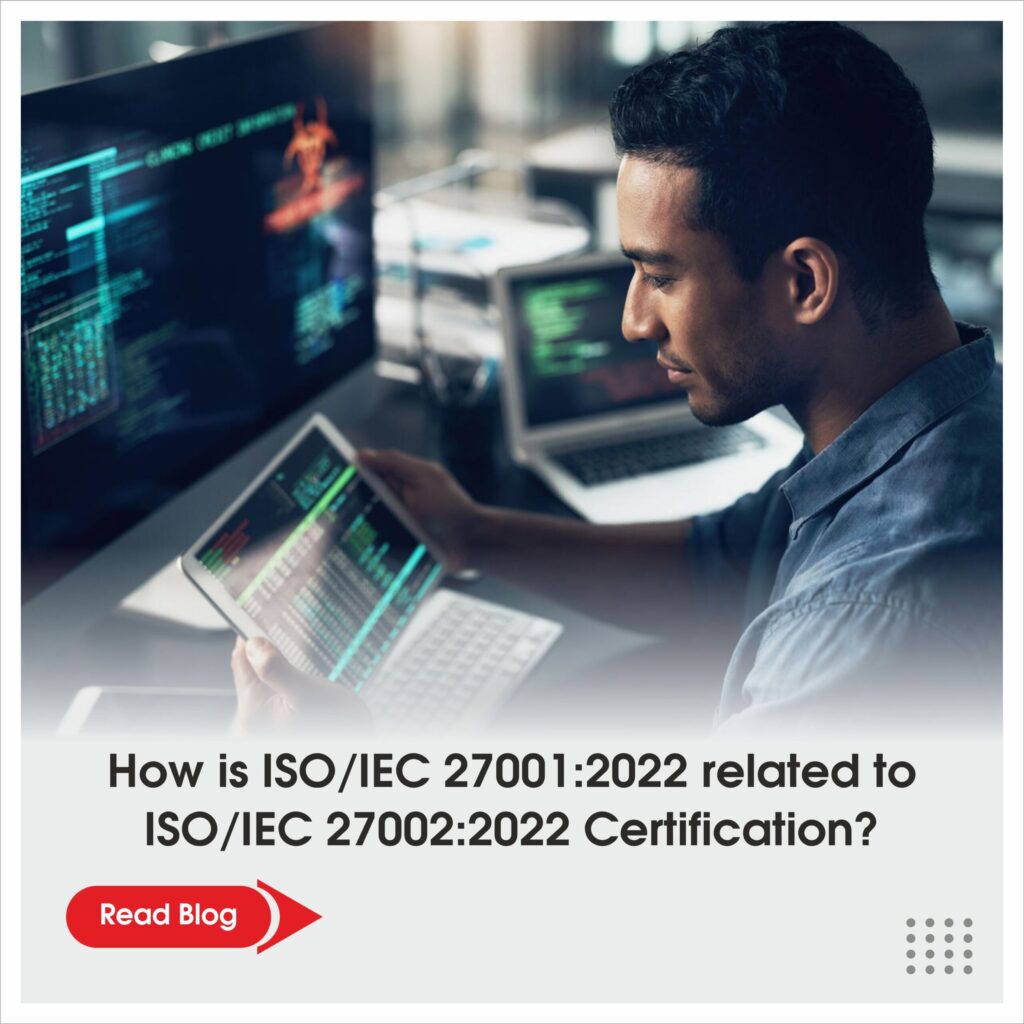
Corporate organisations must protect the users’ and clients’ sensitive information. However, companies have found it difficult to prevent unauthorised access to sensitive, vital, or restricted information. As a result, it can lead to permanent harm to their operations. Organisations can protect information assets using the ISO 27000 series of standards. Furthermore, it helps organisations better manage the security of assets like financial data, intellectual property, and employee information. The most well-known standard in this family is ISO/IEC 27001 for Information Security Management System (ISMS), also connected to ISO 27002 Certification. What is ISO/IEC 27001:2022 Certification? Organisations often face challenges in effectively managing cyber risks in the face of escalating cybercrime and the emergence of new threats. However, ISO/IEC 27001:2022 certification offers a robust framework to address these challenges for organisations across various sectors. Organisations can systematically enhance their ability to identify, assess, and mitigate cyber vulnerabilities by adhering to ISO/IEC 27001 standards. The certification promotes a comprehensive approach to information security, encompassing the scrutiny of personnel, policies, and technological infrastructures. Implementing an information security management system with ISO/IEC 27001 not only serves as a pivotal tool for risk management but also fosters cyber resilience and operational excellence within the organisation. What is ISO/IEC 27002 Certification? ISO/IEC 27002 is a complementary standard focusing on the information security controls that organisations must deploy. These controls are part of Annex A of ISO/IEC 27001, a reference frequently cited by information security professionals when discussing such measures. However, while Annex A security controls provide concise descriptions of each control in a sentence or two, ISO/IEC 27002 offers a more comprehensive exploration by allocating approximately one page per control. This depth allows the standard to explain the functionality of each control, articulate its objectives, and provide guidance on its implementation. Is ISO/IEC 27001 the same as ISO/IEC 27002? ISO 27001 is the primary standard for certifying a business, whereas ISO 27002 is a supplementary standard offering guidance on implementing security controls. An essential distinction is while ISO 27001 certification is attainable for a company, ISO 27002 certification is voluntary. How is ISO/IEC 27001 different from ISO/IEC 27002 Certification? ISO/IEC 27001:2022 certification is achievable, whereas ISO/IEC 27002 certification is not. ISO/IEC 27002 is intended for use by organisations as a reference for control selection that provides guidelines for information security management practices, including security controls implementation and management. ISO/IEC 27001 also documents requirements for setting up, implementing, maintaining, and continuously improving an information security management system. Standards that contain regulations can be certified by organisations, but standards that offer guidance cannot be certified. Other differences are as follows: ISO 27001 offers a concise overview of an Information Security Management System (ISMS), leaving detailed guidance to supplementary standards like ISO 27002. Other standards, such as ISO 27003 and ISO 27004, provide specific advice on ISMS implementation and monitoring. An organisation can attain ISO 27001 certification but not ISO 27002 certification. Moreover, this is because ISO 27001 outlines comprehensive compliance requirements as a management standard, while supplementary standards like ISO 27002 focus on specific facets of an Information Security Management System (ISMS). Implementing an Information Security Management System (ISMS) is crucial to recognise that not all information security controls are relevant. ISO 27001 underscores this by requiring organisations to conduct a risk assessment to identify and prioritise security threats. However, ISO 27002 lacks directives and is challenging to determine suitable controls. Latest Revision in ISO/IEC 27001 and ISO/IEC 27002 Certification ISO/IEC 27001:2013, last updated in 2022, the full title of the new version is ISO/IEC 27001:2022 for Information Security, Cybersecurity and Privacy Protection. Changes of ISO/IEC 27001:2022 Certification Annex A provides references to the controls included in ISO/IEC 27002:2022, encompassing both the control and its title. Editorial revisions to the note in Clause 6.1.3 c) include the removal of the “control objectives” and the substitution of “control” for “information security control.” Clause 6.1.3 (d) has been reworded to remove ambiguity and increase clarity. Scope and Context: It requires an organisation to identify the pertinent requirements of stakeholders and determine which ones need to be incorporated into the ISMS. Moreover, this involves explicitly outlining the necessary processes and their interrelationships within the ISMS framework. Planning: The latest updates to information security standards emphasise monitoring information security objectives by mandating an organisation to maintain proper documents. Moreover, a new subclause addresses planning changes to the ISMS without prescribing specific processes. Therefore, organisations must ascertain methods to demonstrate the planning of changes within their ISMS. Annex A: The Annex A has undergone revisions to ensure alignment with ISO 27002:2022. The subsequent section delves into a detailed discussion of the controls outlined in Annex A. Changes in ISO 27002 Certification ISO 27001:2022 now lists 93 controls compared to the 114 in ISO 27001:2013, primarily due to the consolidation of 56 controls into 24, while no controls have been eliminated. These controls are organised into four overarching themes rather than 14 clauses, namely: People (8 controls) Organisational (37 controls) Technological (34 controls) Physical (14 controls) Additionally, several new controls have been introduced, including Threat Intelligence, Information security for the use of Cloud services, ICT readiness for business continuity, Physical security monitoring, Configuration management, Information deletion, Data masking, Data leakage prevention, Monitoring activities, Web filtering, and Secure coding. ISO 27002 controls are further categorised into five attribute types; these are: Control type (preventive, detective, corrective) Information security properties (confidentiality, integrity, availability) Cybersecurity concepts (identity, protect, detect, respond, recover) Operational capabilities (governance, asset management, etc.) Security domains (governance and ecosystem, protection, defence, resilience). Conclusion ✅ The transition to the updated ISO/IEC 27001 standard should be smooth, with minor adjustments required for compliance. The main standard changes are minimal to facilitate quick updates to documentation and processes. Annex A controls see moderate changes but can be integrated into existing documentation. Expectations for sweeping revisions were high but not realised.
ISO 13485:2016 MD-QMS – Catering the needs of Non-Active Medical Devices
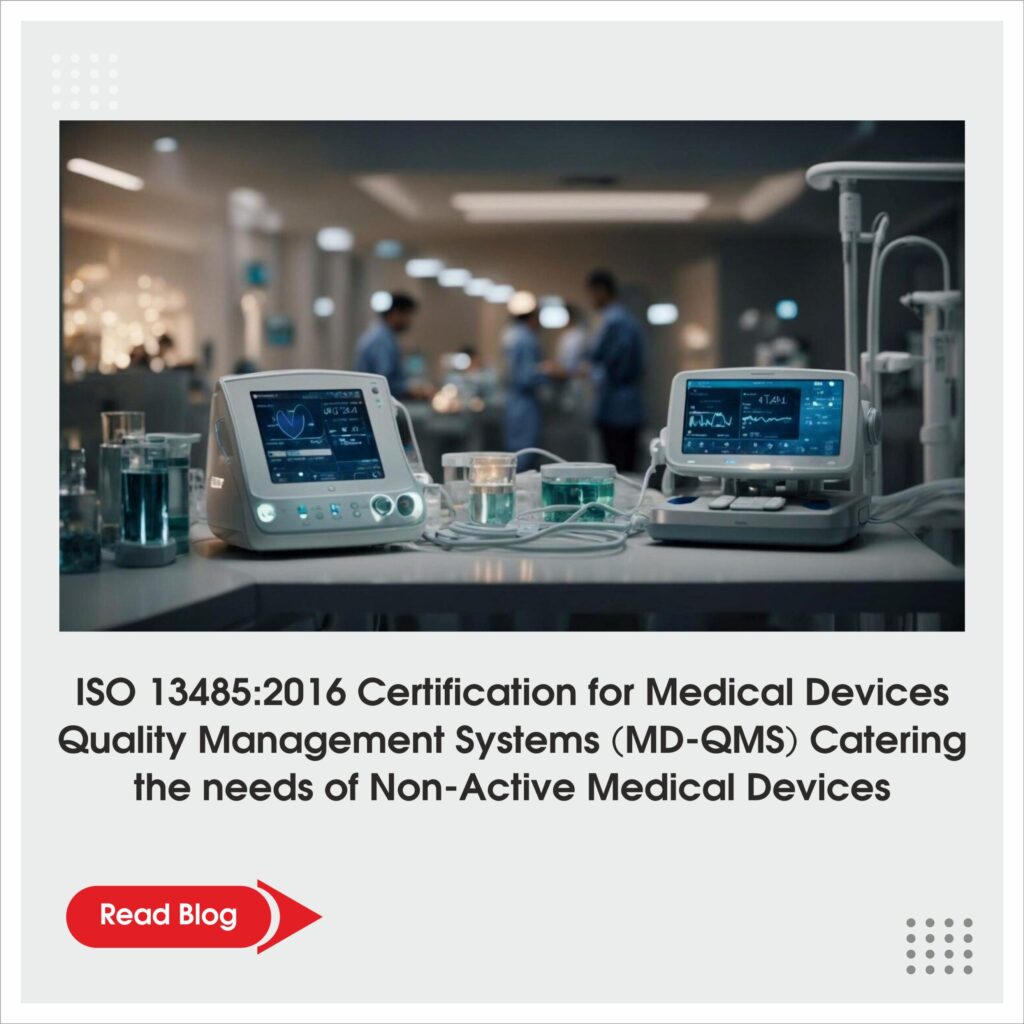
ISO 13485 Certification outlines the framework for organisations to provide high-quality medical equipment to satisfy consumers, clients, and stakeholders. Organisations engaged in one or more phases of the life cycle of a medical device, such as design, development, production, storage, distribution, installation, and technical support, should take note of this accreditation. The MD-QMS requires external parties and suppliers to provide top-notch goods and services to guarantee the safety and well-being of clients and customers. What is Non-Active Medical Devices? Non-Active Medical Devices form part of the Main Technical Areas under ISO 13485:2016 Certification. Moreover, Main Technical Areas are divided into five categories; these are :- General Non-Active, Non-Implantable Medical Devices Non-active medical devices do not rely on an external energy source for operation. These devices are crucial in healthcare settings and necessitate thorough testing to ensure user safety and intended functionality. It includes: Non-active devices for emergency, anaesthesia and intensive care Non-active devices for injection, transfusion, infusion and dialysis Non-active medical devices with measuring function Non-active ophthalmologic devices Non-active medical devices for disinfecting, cleaning and rinsing Non-Active Implants Inactive implants encompass various types, such as non-active cardiovascular, orthopaedic, functional, and soft tissue implants. Moreover, these implants are not used for permanent placement within the human body. It includes: Non-active cardiovascular implants Non-active orthopaedic implants Non-active functional implants Non-active soft tissue implants Devices for Wound Care Wound care medical devices assist in dressing wounds. They encompass materials such as cotton wool, bandages, gauze dressings, sutures for closing dermal wounds lasting less than 30 days, and surgical gloves. These devices do not contain antimicrobial agents and do not utilize animal tissues. It includes: Wound dressings and bandages Clamps and suture material Other medical devices for wound care Non-Active Dental Devices and Accessories Non-active dental devices and accessories encompass various dental instruments and equipment, ranging from X-ray cones to face bows. Additionally, this category includes dental materials and implants. Non-active dental instruments and equipment Dental materials Dental implants Non-Active Medical Devices other than Specified Above Conclusion ✅ The ISO 13485:2016 certification outlines further prerequisites tailored for the healthcare and medical device sectors to address heightened risks and safety concerns for patients. However, this certification applies to organizations, offering detailed guidelines for establishing, monitoring, and managing quality management systems to regulate processes and services effectively.
Benefits of ISO Certifications in Mongolia
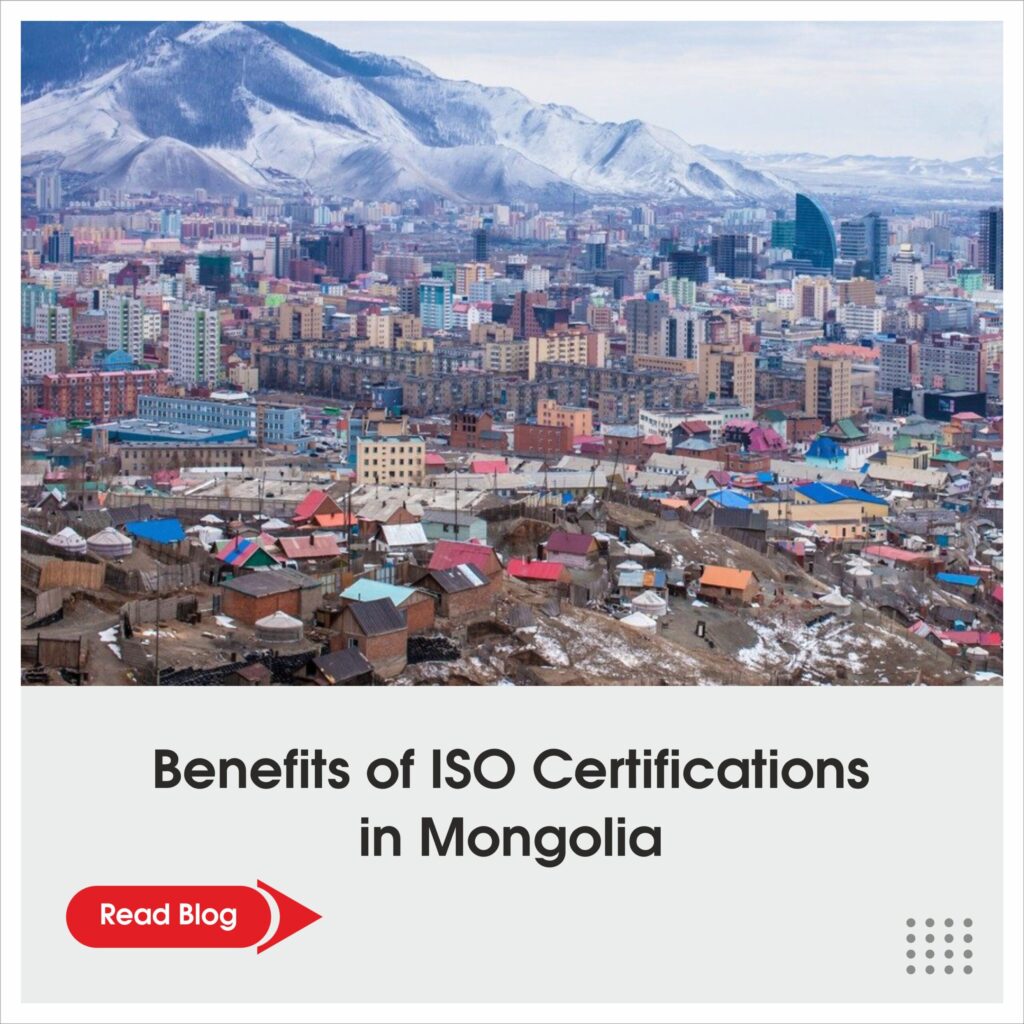
ISO certification bodies in Mongolia provide a range of ISO certification services, encompassing ISO 9001, ISO 14001, and ISO 27001. Among the respected ISO certification bodies in Mongolia is SIS Certifications Pvt Ltd, which extends diverse services to companies aimed at grasping the significance of international standards. These certification bodies offer extensive assistance in implementing and acquiring ISO certifications, ensuring adherence to global standards. Organisations in Mongolia can apply for the following ISO Certifications The International Organisation for Standardisation (ISO) has developed more than 22,521 international standards covering various sectors of the economy, such as technology, food safety, services, healthcare, and agriculture. The global influence of ISO International Standards is evident from the growing demand and importance for businesses. The various types of ISO Certifications are as below :- ISO 9001:2015 Certification for Quality Management Systems (QMS) in Mongolia :It is one of the most widely used methods for developing, implementing, and maintaining a “Quality Management Programme” that can be used by any business and is adaptable enough to meet the needs of various sized and types of organisations. ISO 14001:2015 Certification for Environmental Management Systems (EMS) in Mongolia : ISO 14001 offers guidance for establishing an environmental management system (EMS) comprising documents, policies, strategies, processes, and procedures that outline how a business interacts with the environment. ISO 45001:2018 Certification for Occupational Health and Safety Management Systems (OHSMS) in Mongolia :ISO 45001 is a management system for occupational health and Safety Management System (OHSMS). It provides companies with a framework for risk management and improves the effectiveness of OH&S. Essential elements include the commitment of the leadership, employee involvement, risk assessment and hazard identification, legal and regulatory compliance, emergency preparedness, incident investigation, and continuous improvement. ISO/IEC 27001:2022 Certification for Information Security Management Systems (ISMS) in Mongolia: The latest edition of the information security standard, ISO 27001, was published in 2022. It delineates precise requirements for designing a suitable management system for information security under managerial oversight. Organisations in Mongolia that fulfil these requirements may undergo an audit process and become certified by an accredited certification body. ISO 41001:2018 Certification for Facility Management Systems (FMS) in Mongolia:ISO 41001 accreditation for Facility Management Systems (FMS) shows an organisation’s dedication to providing the necessary assistance to deliver quality services. Additionally, it supports the implementation of suitable controls and technologies by an organisation to guarantee efficient facilities management. ISO 22301:2019 Certification for Business Continuity Management System (BCMS) in Mongolia:The ISO 22301 standard offers a strong and durable framework for organisations to maintain essential operations even during crises or unexpected events. Certification under this standard equips organisations in Mongolia to prepare for unforeseen incidents by developing suitable recovery and disaster management plans. ISO/IEC 27701:2019 Certification for Privacy Information Management Systems (PIMS) in Mongolia:The Privacy Information Management System (PIMS) requires organisations to deploy suitable security measures to protect users’ personal and confidential data. Additionally, it entails implementing the security controls outlined in the ISO 27002 certification. ISO 22000:2018 Certification for Food Safety Management Systems (FSMS) in Mongolia:ISO 22000 outlines the requirements of a food safety management system (FSMS) applicable to any organisation involved in the food chain, directly or indirectly. It demonstrates compliance with pertinent legal and regulatory standards concerning food safety. Benefits of ISO Certifications in Mongolia An organisation in Mongolia can benefit from ISO certification in multiple ways by solving different problems. These are the following :- It provides an organisation in Mongolia with international recognition, enhancing its credibility and dependability in the global market. The International Organisation for Standardisation (ISO) provides best practices to maintain compliance with environmental, information security, and quality standards. Organisations can show their dedication to quality and compliance by meeting the demands of stakeholders, clients, and customers with ISO certification. ISO standards help organisations in Mongolia to save costs by improving customer satisfaction and business processes to ensure sustainable growth. ISO standards assist businesses in identifying and reducing any risks and threats by implementing the necessary actions to guarantee long-term sustainability. Conclusion ✅ ISO Certification enhances the credibility and reliability of different industries in Mongolia. Furthermore, selecting a reputable and dependable certification body enhances an organisation’s accreditation credibility. The industrial and service sectors constitute a significant portion of Mongolia’s GDP. Additionally, ISO certifications are vital for addressing healthcare and education challenges and can foster economic growth by ensuring long-term sustainability.
Why is ISO/IEC 27001:2022 Certification Important for the Information Technology (IT) Industry?
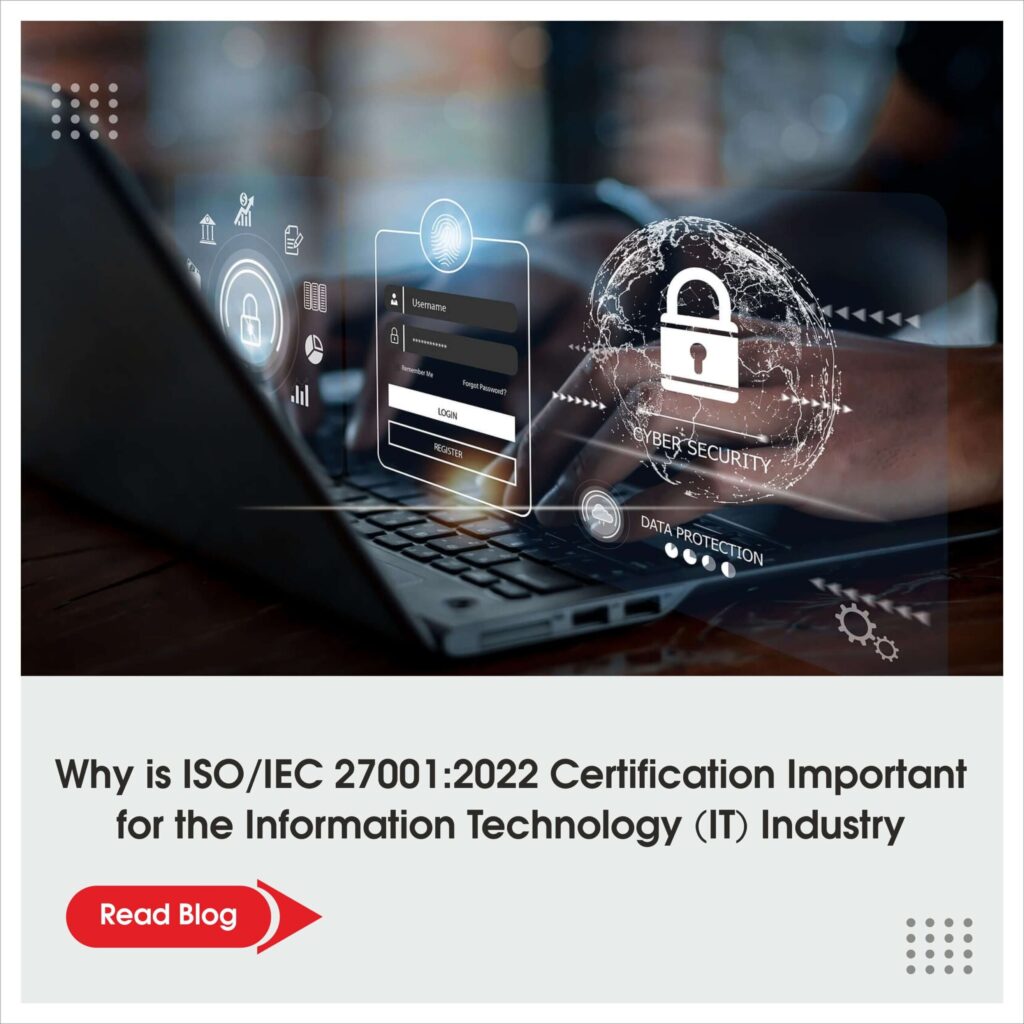
ISO 27001 is a universally acknowledged information security framework that evaluates the effectiveness of an organisation’s Information Security Management System (ISMS) in safeguarding its data. Achieving an ISO 27001 certification showcases that an organisation adopts a robust information security stance to protect the sensitive information of clients, customers, partners, and other stakeholders. What is ISO/IEC 27001 Certification? The ISO/IEC 27001 standard emerged from a collaboration between the International Organisation for Standardisation (ISO) and the International Electrotechnical Commission (IEC) to assist businesses in crafting secure systems and validating their security stance through certification. ISO/IEC 27001 centres on an organisation’s Information Security Management System (ISMS), including policies and procedures to eliminate security threats and risks and safeguard data. Organisations must undergo an audit ensuring compliance with requirements and mitigation of potential system risks to attain ISO 27001 certification. Which Organisations Can Apply for ISO/IEC 27001:2022 Certification? Organisations across various sectors and industries are eligible to pursue ISO/IEC 27001 certification. Moreover, the certification provides the organisations with an adequate Information Security Management System (ISMS) following the standard’s requirements. A list of organisations that can apply for ISO/IEC 27001 Certification :- Finance Sector Healthcare Industry Information Technology (IT) Industry Manufacturing Sector Education Sector Government Sector Importance of ISO/IEC 27001:2022 Certification for Information Technology (IT) Industry ISO/IEC 27001:2022 Certification is the world’s first and most widely used standard for International Standard for Information Security Management. Tech companies face many information security-related difficulties when they develop and enter foreign markets. Moreover, this is particularly valid when handling sensitive data, such as financial transactions or personal information. A business can streamline and verify various processes to safeguard clients’ and customers’ data by obtaining ISO/IEC 27001 certification. Some of the benefits of ISO/IEC 27001 Standard for Information Technology (IT) Companies are as follows :- ISO/IEC 27001 requires an organisation to conduct a risk assessment to formulate appropriate incident response and risk management strategies. Information Technology (IT) Companies can showcase their commitment to information security to customers and partners through certification under this standard. ISO/IEC 27001 for Information Security Management Systems (ISMS) signifies that the IT company prioritises safeguarding sensitive data and has established effective processes and systems to achieve information security goals. Tech companies can tap into new revenue sources and explore new business opportunities nationally and internationally by becoming an ISO/IEC 27001-certified organisation. Numerous countries enforce laws and regulations mandating companies to safeguard personal information and other sensitive data. Information Technology (IT) companies can exhibit compliance with these regulations with ISO/IEC 27001 Certification. ISO/IEC 27001 certification helps IT companies identify and mitigate potential risks by adopting a risk-based approach. Additionally, it helps companies avoid penalties and fines while affirming their commitment to data protection. Obtaining ISO/IEC 27001 certification is the first step towards a tech company’s international expansion. In today’s highly competitive environment globally, businesses contest to attract new customers and clients. However, possessing an ISO/IEC 27001 certification to demonstrate a company’s dedication to information security can provide it with a significant competitive edge. Conclusion ✅ Many well-known businesses, including those on the Fortune 500, need their suppliers to be ISO/IEC 27001 certified. However, this need is mandatory in industries like finance and healthcare, where maintaining data security is vitally important. Moreover, the information technology (IT) industry can become more aware and information security conscious with ISO/IEC 27001:2022 Certification.
What are the requirements of ISO 41001:2018 Certification?
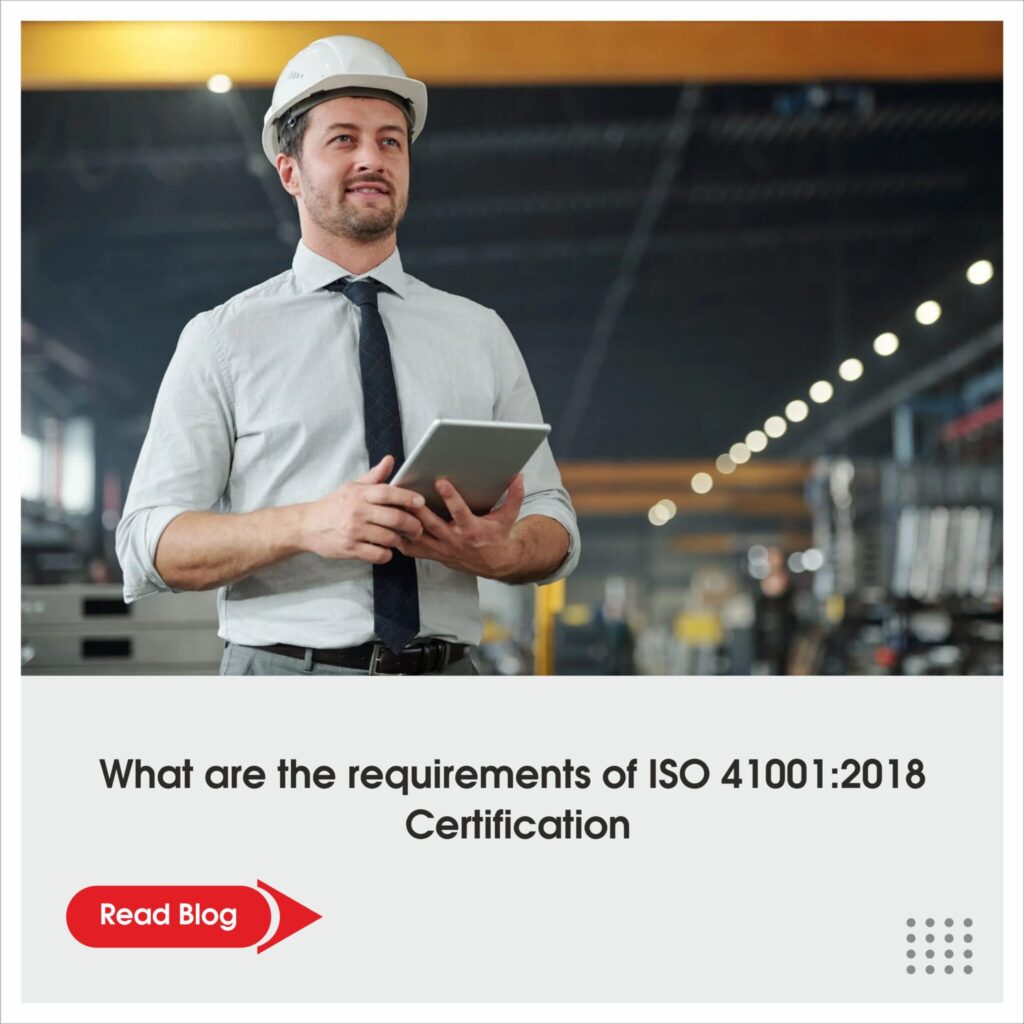
The ISO 41001 standard amalgamates individuals, locations, and procedures within constructed spaces to improve occupants’ experiences and boost business productivity. However, the International Organisation for Standardisation (ISO) released the ISO 41001 for Facility Management System (FMS) in 2018. The certification is suitable for organisations, including public or private, irrespective of their size, scope, or geographical remoteness. Furthermore, the ISO 41001 standard is crafted to address the growing intricacies of facility management. Why should an organisation apply for ISO 41001:2018 Certification? ⮯ ISO 41001 is the first international facility management system (FMS) standard in the world. Facility management is an organisational function that combines people, place, and process to enhance the built environment’s quality of life and the productivity of the company’s main business. ISO 41001 certification constructs a comprehensive environment for buildings, external works, and infrastructure in a given area. It improves quality of life by raising safety standards and improving working conditions for those who operate in the built environment, for example, walkways, walls, buildings, electrical and mechanical systems, and more. However, implementing ISO 41001 enhances the productivity of core company operations. Furthermore, it focuses on improving societal services, including healthcare, education, retail centres, hotels, condos, and hospitality, among other areas. Which organisations can apply for ISO 41001 Certification? ⮯ ISO 41001 helps organisations adopt an adequate facility management system to build safe communities and attain sustainable growth. Here is a list of organisations that can apply for ISO 41001 standard :- Corporate businesses Government agencies Educational institutions Healthcare facilities Manufacturing companies Retail establishments Hospitality industry Non-profit organisations Transportation and logistics companies Energy and utility providers Real estate management firms Technology companies Construction companies Financial institutions Telecommunications companies Pharmaceutical companies Requirements of ISO 41001 standard ⮯ ISO 41001 is an internationally recognised standard for Facility Management systems that improves and modernises an organisation. The ISO 41001 has ten requirements, and out of these, seven requirements are mandatory. These are: Section 4: Context of the organisation This section deals with understanding the requirements of an organisation for implementing the appropriate Facility Management System. It also helps organisations to tailor the FMS as per the organisational requirements. Section 5: Leadership This clause focuses on the importance of top management in the FMS implementation. Every individual within the organisation must understand their specific duties and responsibilities to adopt an effective FMS. Section 6: Planning The planning clause entails risk analysis and system analysis to reduce risks and establish goals for an efficient FMS. It also mandates organisations to examine its interaction with itself at all levels and through various channels. Section 7: Support This clause mandates an organisation to arrange all the required resources to establish an effective FMS, from implementing a system to overseeing documented information within the organisation to allocating resources. Section 8: Operation Clause 8 of ISO 41001 addresses the operational specifications for facility management. Moreover, it also entails getting the company ready for any unforeseen circumstance. Section 9: Performance Evaluation It guaranteed the effectiveness of an FMS. Moreover, this part monitors things to evaluate the system and pinpoint areas that could use improvement. Section 10: Continuous Improvement Section 10 of ISO 41001 guarantees the effectiveness of the FMS. Organisations ensure ongoing evaluations of their compliance with the ISO 41001 standard. Conclusion ✅ The International Organisation for Standardisation (ISO) has released ISO 41001:2018 as a global standard for the Facility Management System (FM) into practice in businesses. Moreover, it deploys the most upgraded standards for facility management within the organisation. Since the frameworks for ISO 45001, ISO 9001, and ISO 14001 certifications are the same, it is simpler to integrate all of these management systems.
Achieving Excellence in Facility Management: The Role of ISO 41001 Certification
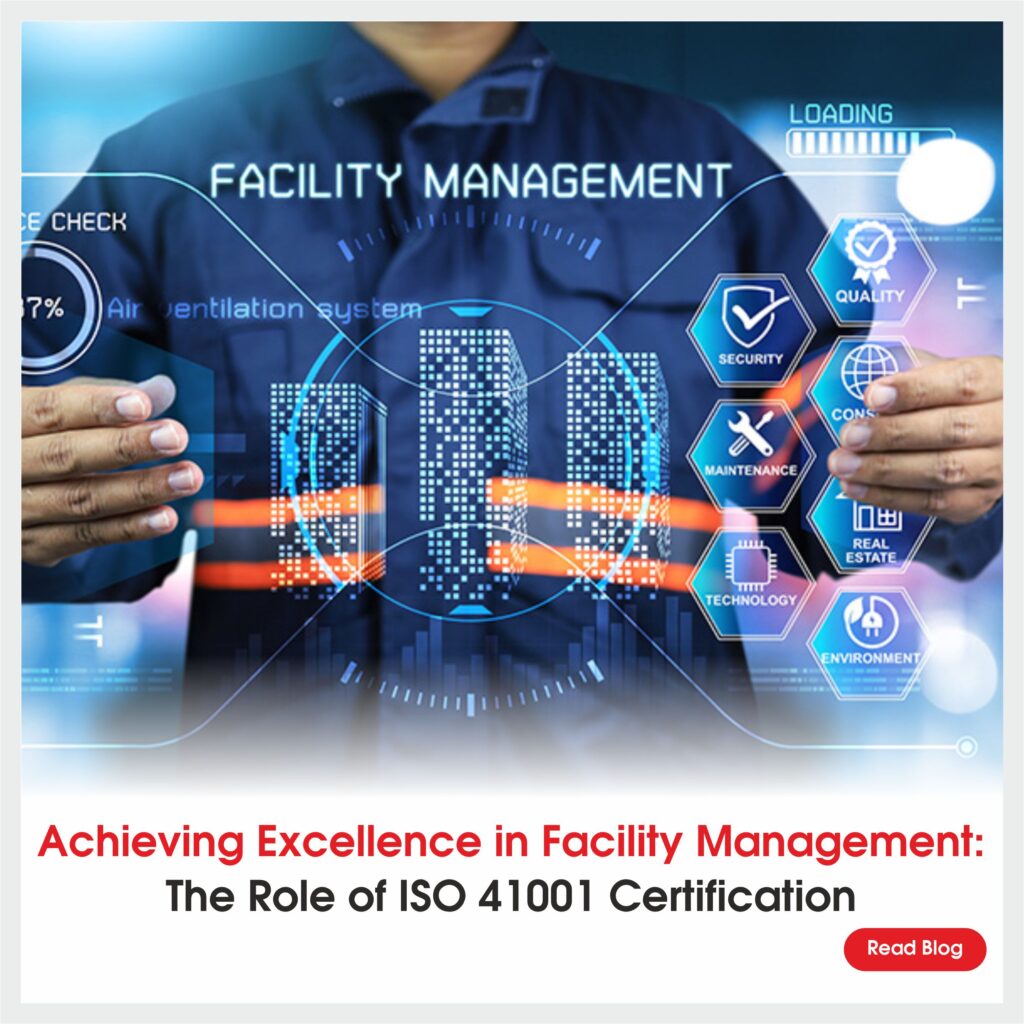
ISO 41001 certification outlines the framework for organisations to improve operational effectiveness, allocate resources optimally, and safeguard the welfare of stakeholders and employees. Organisations can increase productivity and cut expenses by streamlining their facilities management procedures by putting ISO 41001 into practice. Implementing ISO 41001 offers a goldmine of benefits for various companies irrespective of their size and nature. It helps organisations improve their decision-making procedures to enhance operational effectiveness, allocate resources optimally, and safeguard the welfare of stakeholders and employees. In terms of the organisation’s facilities management procedures, it also aids in identifying possible hazards and areas for development. Furthermore, ISO standards are essential for maintaining quality and uniformity across businesses. Organisations can increase their competitiveness in the market and show their dedication to quality by following globally recognised standards like ISO 41001. What is ISO 41001:2018 Certification? ⮯ The first worldwide facility management system (FMS) standard produced by ISO was the ISO 41001 standard, launched in 2018. It combines a variety of disciplines to impact people’s interactions with the physical environment and the productivity and efficiency of economies in societies, communities, and organisations. Through the services it administers and provides, the Facility Management System impacts the health, happiness, and standard of living of a large portion of global society and population. The goal of ISO 410001 is to enhance the productivity and the well-being of people and stakeholders by integrating People, Places, and Processes within the built environment. The standard is significant for companies that use or incorporate facilities management systems and wish to implement compliance with the new standard into their operations. Why is there a Need for ISO 41001 standard ⮯ ISO 41001 is one of the most relevant and significant standards in the current economic landscape, yet it is the most underrated one. The following points explain the need and significance of ISO 41001 certification for organisations :- ISO 41001 for FMS can show that its facilities management services are delivered effectively and efficiently. The certification has the potential to satisfy the needs of clients and interested parties. The certification enables an organisation to make plans to be sustainable in a highly competitive global context. Types of Facility Management System ⮯ ISO 41001 for Facility Management Systems (FMS) divides the facility management procedures into two groups. These are: Soft Facility Management Systems Hard Facility Management Systems Soft Facility Management System: Facility Management services like cleaning and catering fall under the soft facility management system. Hard Facility Management System: Facility Management services that oversee physical aspects, like plumbing and building maintenance, are part of the hard facility management system. Scope of ISO 41001 Certification ⮯ The scope of ISO 41001 certification for Facility Management Systems (FMS), includes : – Hard facility management takes care of the infrastructure and the area. With an emphasis on (work-) space and (building-) infrastructure (such as planning, design, workplace, construction, lease, occupancy, maintenance, and furniture), this refers to the physical built environment. Hard facility management is concerned with the structural elements of the immovable structure. These constitute “the essentials” and guarantee employee safety and well-being. The majority of hard services are mandated by law and come with requirements like: Heating Lighting Plumbing Fire safety systems Air conditioning Preventative building maintenance or building improvements Electro-mechanical maintenance Benefits of ISO 41001 certification for organisations ⮯ The following are the benefits of ISO 41001:2018 Certification Facility Management Systems (FMS). These are :- No regulatory body governs the ISO 41001, and compliance with the guidelines is entirely voluntary and attracts no penalty. On the other hand, it aims to guarantee adherence to all FMS-related rules and regulations and to enhance the facility management system. It improves an organisation’s profitability and marketability. The facility services provided by an organisation are guaranteed to be safe and to foster a productive workplace by ISO 41001 standards. The ISO 41001 Certification is an affordable requirement. It reduces the additional expenses incurred for premiums and compensation amounts by improving worker productivity, safety, health, and well-being. ISO 41001 helps a company adjust to the constantly shifting trends in infrastructure development and use strategies and tools to manage them appropriately. It seeks to give workers a better working environment. Establishing supportive, sustainable, and productive workplaces is the goal of ISO 41001 certification. Conclusion ✅ ISO 41001 certification is the first standard in the world for Facility Management Systems (FMS). It increases a facility management company’s brand visibility and offers a foundation for building safe and secure environments. Any organisation, regardless of size, can apply for ISO 41001 Certification to enhance its reputation in the marketplace and grab new opportunities.
ISO 21001:2018 Certification – A valuable tool to make Educational Institutions more student centric
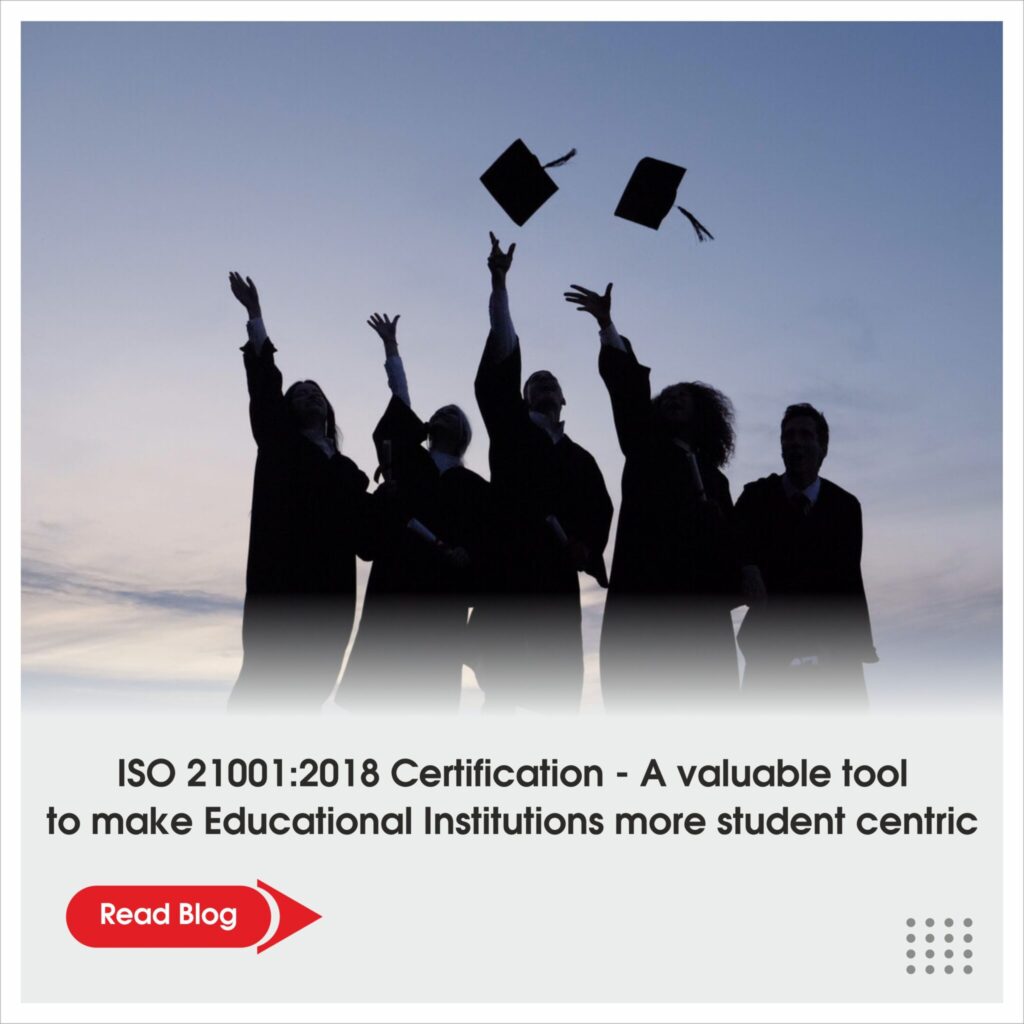
Education helps people improve their living standards while strengthening ties to the community and preparing us to contribute as valued members of society. People can learn new things, widen their perspectives, and improve their outlook on life. Education prepares students for the workplace, life, and the future by laying out clear, measurable standards. The International Organisation for Standardisation (ISO) has created the ISO 21001 Certification for educational institutions to build and enhance a more effective teaching-learning environment. What is ISO 21001:2018 Certification? ⮯ ISO 21001 Certification provides a framework for creating adaptable, transparent, and inclusive classrooms for Educational Organisation Management Systems (EOMS), which enables an organisation to offer personalised learning to satisfy the needs and expectations of each learner. A learner-centric approach is encouraged by ISO 21001 certification, which actively involves students in their education. The International Organisation for Standardisation (ISO) released it in 2018 to enable educational institutions to offer top-notch services. In addition to providing more individualised instruction for distant learners and students with special needs, it supports fair and accessible education for all. A List of Organisations that can apply for ISO 21001:2018 Certification ⮯ Any educational institution, regardless of size, type, or location, including private ones, is eligible to apply for ISO 21001 accreditation. The following is a list of companies that can apply for ISO 21001 accreditation for their Educational Organisation Management System (EOMS): Tutoring or Coaching Centres Training Institutes Special Education Schools Universities K-12 Schools Pre-schools Colleges Adult Education Centres Vocational Education Centres Benefits of ISO 21001 Certification ⮯ ISO 21001:2018 certification offers a goldmine of benefits for Educational Institutions. These are :- ISO 21001 improves the consistency of goals with policies and raises the educational institutions’ legitimacy and dependability. Educational Organisation Management Systems (EOMS) encourage personalised teaching-learning environments to ensure that all students, regardless of gender, handicap, or place of origin, can access education. ISO 21001 Certification encourages inclusive education and provides educational institutions with the means to meet the needs of all learners, including those with special needs and multilingual classrooms. Educational Institutions can maintain compliance with ISO 21001 standards to guarantee a thorough education for students. Moreover, it helps institutions exhibit their commitment to providing high-quality instruction that goes above and beyond for students. ISO 21001 Certification gives an organisation a comprehensive approach and unifies disparate regional, national, and international laws, regulations, and standards into a single framework. Educational Organisation Management Systems (EOMS) increases the social duty of educational institutions by giving everyone access to a fair, high-quality education. Conclusion ✅ The International Organisation for Standardisation (ISO) developed ISO 21001 as a global standard to provide management tools to companies that provide educational services and goods. Organisations must first compile all pertinent company information in a systematised manner to become ISO 21001 Certified. After that, organisations must document pertinent company information. Every piece of documented knowledge needs to be implemented within the company. In the next step, the organisation must prepare for internal audits. Finally, the organisation will receive the necessary ISO standard if the certifying organisation approves the management system.
What is PCI-DSS Certification
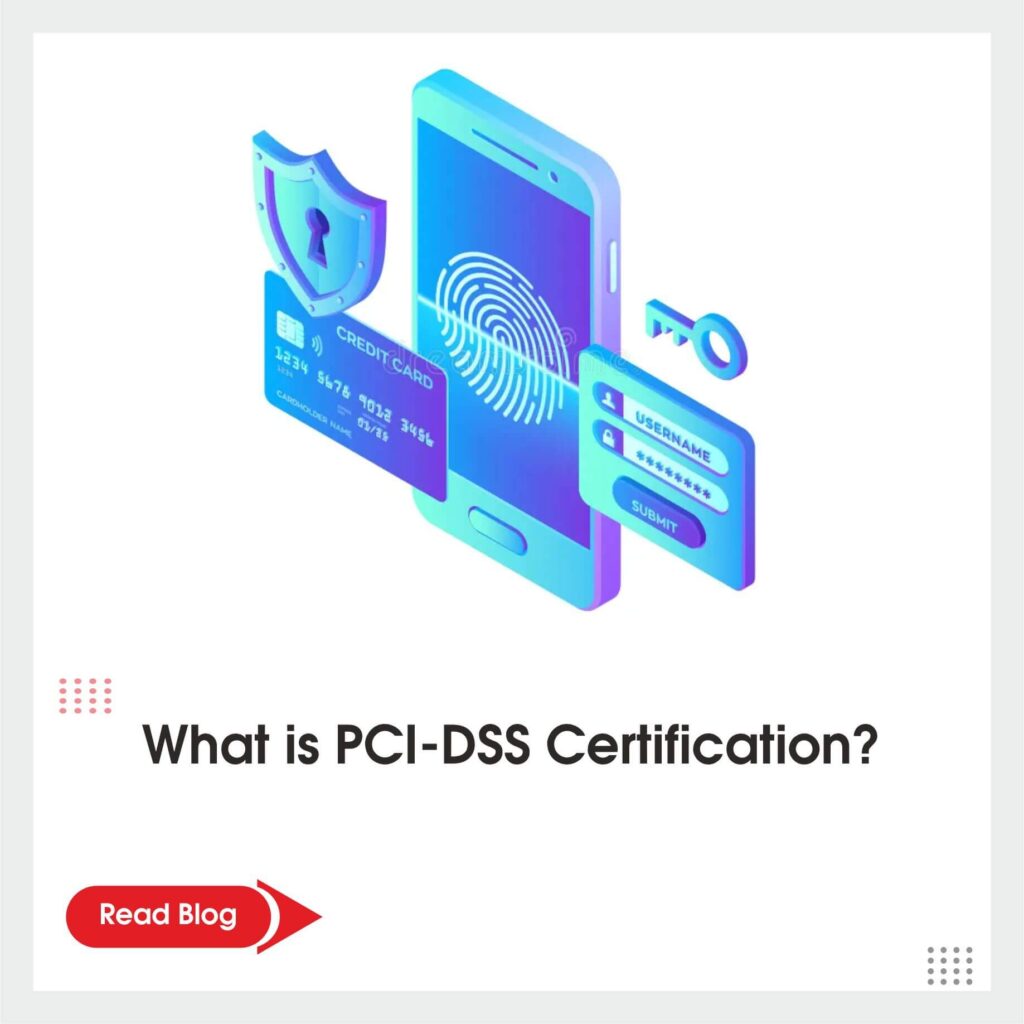
India’s economy has shown strong resilience amid global uncertainties, with a robust growth of 6.9% in the fiscal year 2022-23. The real GDP growth is estimated to be 7.7% year-on-year during the first three quarters of FY 2022-23. India’s financial sector remains strong, with improvements in asset quality and robust private-sector credit growth. The central government expects to meet its fiscal deficit target of 5.9% of GDP in FY2023-24. The Payment Card Industry Security Standards Council (PCI SSC) is an independent body founded by the major payment card brands, namely American Express, Discover, JCB, MasterCard, and Visa. The organisation has developed the Payment Card Industry Data Security Standard (PCI-DSS) to ensure safety and security in debit and credit card payments. PCI-DSS Certification ⮯ A survey conducted by an American Institution showed that 90% of Americans used a Debit or Credit Card as their Primary mode of payment. Moreover, organisations that accept card payments must know about Payment Card Industry Data Security Standard (PCI-DSS) Certification. The Payment Card Industry Data Security Standard (PCI DSS) is a set of guidelines demonstrating an organisation’s ability to handle, store, or securely transmit credit card data. It protects the cardholder’s data during credit card transactions by lowering the possibility of fraud and breaches. PCI DSS offers a comprehensive framework for organisations to adopt a proactive approach to prevent, detect, and respond to security problems. All retailers, banks, service providers, and other businesses involved in the payment card ecosystem are subject to PCI DSS. Moreover, non-compliance can attract penalties, fines, or limitations on card processing. Why is There a Need for a PCI-DSS Certification? ⮯ Organisations involved in processing or storing cardholder data, whether a start-up or large corporation, must obtain the PCI DSS certification to ensure safety and security. The PCI DSS compliance certification procedure establishes a set of rules specified by PCI SSC to assist in securing card data at your firm. It provides a baseline of security recommendations and control for any cloud-hosted business handling credit card transactions. However, getting and keeping your PCI DSS Certification requires rigorous work and complexity. The good news is that you can simplify the entire process of securing systems by taking the actions listed below. What are the Steps to get PSI DSS Certification? ⮯ Businesses can become PCI DSS certified, and it usually takes one to two weeks, depending on the complexity of the payments and the state of information security at the time. The 11 steps listed below will help you obtain PCI DSS certification are as follow :- Get Familiar with the 12 PCI DSS Certification Requirements Identify What your Company Needs Locate and Map How your Payments Card Data Moves Complete your Self-Assessment Questionnaire Check your Security Controls and Protocols Conduct Quarterly Scans Risk/ Audit/ Security Assessments Conduct Gap Analysis Conducting Internal PCI-DSS Audit Continuously Monitor your System Prepare to get PCI-DSS Certification What is a Merchant According to PCI-DSS Certification? ⮯ According to the PCI SSC – any organisation that takes card payments with the logos of any of the five PCI SSC members: American Express, Discover, JCB, MasterCard, or Visa as payment for products or services is considered a merchant. Although every payment brand has a unique compliance programme, merchants can be categorised into four broad levels. These are: Level 1 Merchants: Each year, over 6 million credit and debit card transactions Level 2 Merchants: Approximately one million to six million credit card transactions per year Level 3 Merchants: 20,000–1,000,000 credit card transactions per year Level 4 Merchants: Less than 20,000 online transactions each year. Benefits of PCI-DSS Certification ⮯ The following are the benefits of PCI DSS Certification :- It ensures the safety of payment systems by adhering to PCI Compliance requirements. Moreover, it demonstrates an organisation’s commitment to stringent controls and protocols to boost clients’ confidence in its services. It improves an organisation’s standing among acquirers and payment brands by attracting exactly the partners your company needs by ensuring PCI compliance. It offers a global card payment security solution for organisations by maintaining compliance with PCI DSS requirements. It is a continuous procedure that helps prevent security breaches and payment card data theft both now and in the future. Corporate security plans benefit from PCI Compliance. PCI DSS improves the efficiency of the IT infrastructure by ensuring PCI compliance. Conclusion ✅ Safeguarding cardholder information is a common problem for companies that process credit cards. It is a wise decision to begin with PCI standards. Problems may arise from ignoring or pursuing PCI DSS sporadically. The best way to protect your data is using PCI DSS, which is also more affordable than running the risk of a data breach. Organisations with PCI DSS Certification can demonstrate their commitment to stringent controls and protocols to make payments safer and more reliable. Moreover, it boosts the confidence of the clients and stakeholders in an organisation’s services and opens new opportunities for them.
What makes ISO/IEC 27701:2019 Certification different from ISO/IEC 27001:2022 Certification?
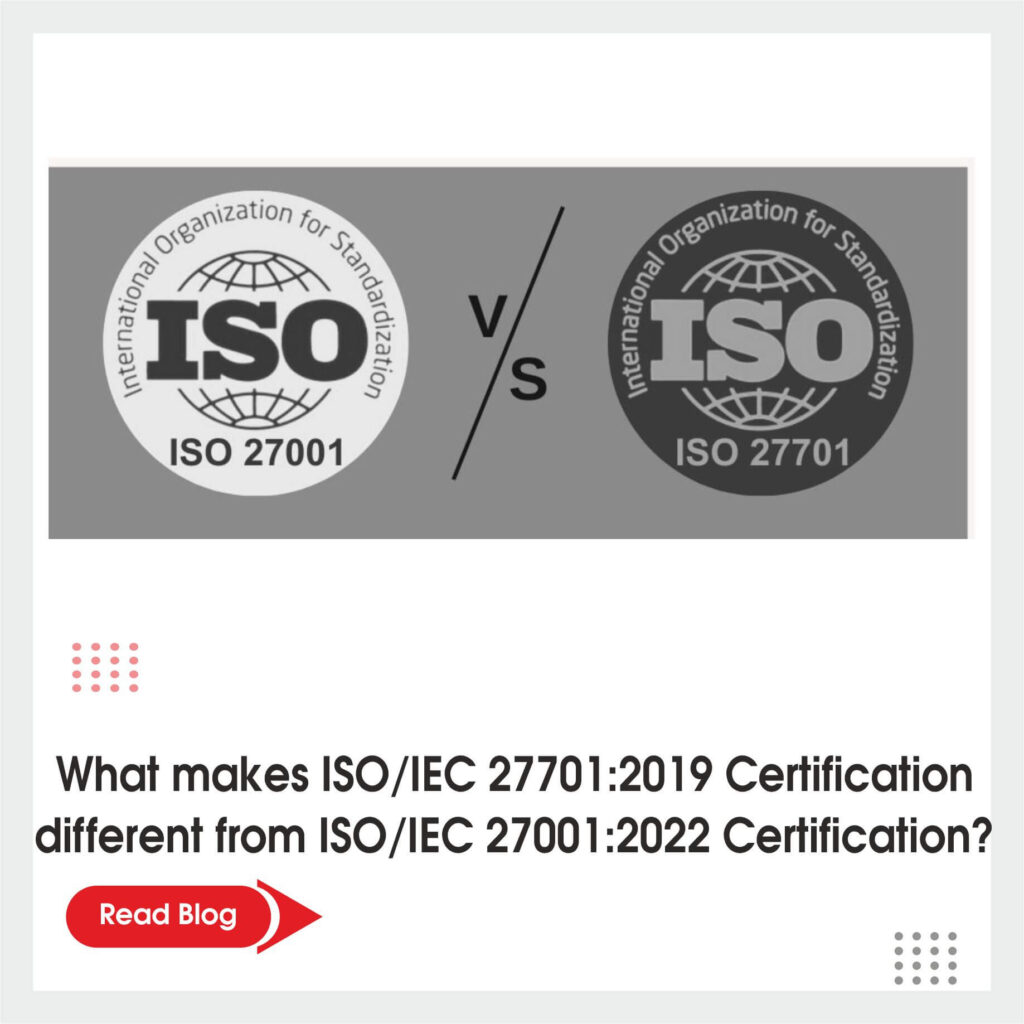
ISO 27000 family of standards covers a broad spectrum of business activities from information security to data privacy. However, 27000 family standards apply to all organisations and are mandatory for businesses collecting and complying with huge amounts of users’ data. The entire world is swiftly transforming into a more connected and digital interface to provide users with better facilities and make life more comfortable. The full name of the ISO 27000 family is the ISO/IEC 27000 family of standards, as these standards are jointly formulated and published by the International Organisation for Standardisation and the International Electrotechnical Commission (IEC). A list of significant standards that are part of ISO 27000 family ⮯ 1.ISO/IEC 27001:2022 Certification for Information Security Management Systems (ISMS) 2. ISO/IEC 27701:2019 Certification for Privacy Information Management Systems (PIMS) 3. ISO/IEC 27002:2022 Certification- extension to ISO/IEC 27001 and ISO/IEC 27701 What is ISO/IEC 27001:2022 Certification? ⮯ ISO/IEC 27001:2022 Standard for Information Security Management Systems (ISMS) outlines the requirements for an organisation to adopt and implement appropriate security controls to attain information security. The standard provides the organisation with the best sets of practices and measures to safeguard the vast amount of users’ data. However, the certification not only demonstrates the organisation’s adherence to the information security regulations but also showcases its responsible behaviour towards the users’ data. An effective information security system within the organisation regularly monitors and ensures the following aspects: It requires an organisation to conduct a risk assessment to identify the potential threats and risks to the valuable data assets. The next step after conducting a risk assessment is to outline appropriate strategies and frameworks to address and eliminate the identified data security risks and threats. An organisation must evaluate, monitor, and analyse the effectiveness of the implemented security controls and tools to ensure information and data security. Lastly, the principle of continuous improvement is the cornerstone of ISO/IEC 27001 to attain the intended outcome. What is ISO/IEC 27002:2022 Certification? ⮯ ISO/IEC 27002 is an extension to ISO/IEC 27001 and ISO/IEC 27701 certifications that aims to provide the organisation to establish, implement, and improve security controls to enhance cybersecurity. Additionally, ISO/IEC 27002 forms part of Annex A Controls of ISMS and provides the organisation with better controls and practices to protect and safeguard users’ data. What is ISO/IEC 27701:2019 Certification? ⮯ ISO/IEC 27701:2019 Certification is an internationally known for Privacy Information Management Systems (PIMS). The standard guides organisations, including Information Technology (IT) Companies, such as SaaS and Cloud Computing, to comply with privacy and information regulations. Moreover, ISO/IEC 27701 outlines the framework for Personally Identifiable Information (PII) controllers and Personally Identifiable Information (PII) processors to maintain users’ data privacy. ISO/IEC 27701:2019 certification aligns with the General Data Protection Regulation (GDPR) to give users the right to access personal information. Moreover, it allows users to manage who can see their confidential data and how and where to use it. Why should organisations go for ISO/IEC 27701:2019 certification even though they have ISO/IEC 27001:2022 Certification? ⮯ Information Security Management System and Privacy Information Management Systems seem to be the same on the surface; however, they are two different yet significant sides of the same coin: data protection. Privacy is a user’s personal information and how s/he allows the other party to access and view it. However, security means protecting the collected and stored data and information with the various organisations. Cybersecurity encompasses both privacy and information security and helps organisations safeguard data against unauthorised access to eliminate leaks and data breaches. Organisations can find the data protection concepts and regulations in ISO/IEC 27701. However, ISO/IEC 27701 is also a part of the security requirements of ISO 27001 standards. Organisations need to define baselines for 27001 to build 27701 policies, processes, and implementation technologies. Hence, it becomes necessary for organisations to obtain ISO/IEC 27701:2019 Certification despite having ISO/IEC 27001:2022 Certification due to the following reasons: Information Security Management System (ISMS) ensures the protection of the valuable data assets of clients and customers. Moreover, the certification provides the organisation with essential resources and controls to manage information security. ISO/IEC 27001 also establishes a flexible framework for oversight and establishing accountability within the organisation’s information security procedures. ISO/IEC 27701 outlines the framework for a Privacy Information Management System (PIMS). Furthermore, since the PIMS includes many of the ISMS’s key components, it is an extension of the organisation’s existing ISMS. Businesses need to ensure expanding 27001 controls to meet the criteria while drafting policies and procedures for data protection. Conclusion ✅ ISO/IEC 27701:2019 and ISO/IEC 27001:2022 certifications work together to provide organisations with better security controls to ensure information security and data privacy. However, the purpose and objective behind publishing both standards vary, as one works to provide tools and controls to attain information security. Whereas the other ensures the protection of users’ private and confidential information.
Primitive Analysis: The most common ISO non-conformity occurs in every organisation
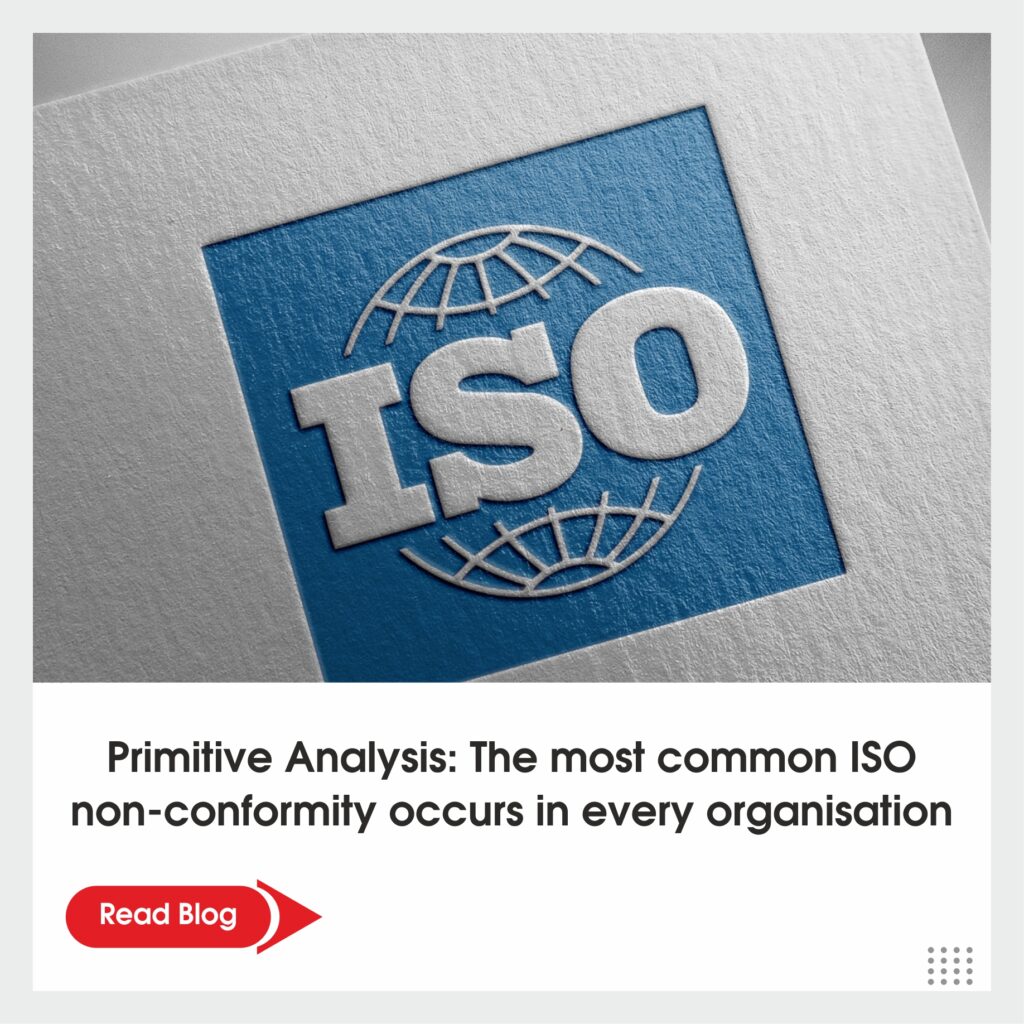
Primitive Analysis is an initial examination or assessment of an organisation’s processes and practices to identify fundamental issues and potential non-conformities with ISO standards. However, an organisation must conduct it at the initial stages of pursuing ISO certification to outline the foundational challenges. “Primitive” in ISO Certification refers to the essential aspects of an organisation’s operations. Moreover, it involves a comprehensive examination to monitor the five key components of primitive analysis to maintain compliance with ISO standard requirements. These five components are as follows: Five Components of Primitive Analysis ⮯ The dream of every organisation is to achieve defined quality requirements. However, quality is an impeccable component in the complex web of organisational procedures. The International Organisation for Standardisation (ISO) certification provides international and national best practices for many people and organisations to attain intended outcomes. In their quest for excellence, organisations often find themselves entangled in the labyrinth of non-conformities. Of these, the most common ISO non-conformity stands out as a persistent issue that is straightforward but persistent. Common Non-Conformities that can occur during Primitive Analysis ⮯ Organisations can attain a more seamless path to ISO certification depending on recognising and resolving the problems early in the certification procedure. Organisations can identify non-conformities during the Primitive Analysis due to non-compliance with ISO standards. The following are possible non-conformities: Incomplete Documentation An organisation must maintain proper documentation of processes as missing, outdated, or incomplete documentation can lead to an ISO non-conformity. Lack of Understanding of ISO Requirements Organisations must gain sufficient knowledge and understanding of the specific ISO standards. However, a misalignment between organisational processes and ISO requirements can cause non-compliance. Inadequate Training and Awareness Programs Adequate training and awareness programs help employees gain a deeper understanding of ISO standards and requirements. Moreover, a lack of training programs to educate employees on ISO standards can result in ISO non-compliance. Vague Resource Allocation An organisation must allocate resources adequately, including human and technological resources, for implementing and maintaining ISO standards. However, inadequate resource allocation can produce unintended outcomes in the organisation. Failure to Identify and Manage Risks Risk identification and management is an essential component of ISO Certification. However, incomplete identification and management of risks could cause ISO non-compliance. Strategies an organisation can implement to prevent non-conformities ⮯ An organisation must resolve ISO non-conformities by adopting a comprehensive strategy. Organisations must take proactive measures to manage documentation clutter and strengthen their procedures against the potential risk of non-compliance. Organisations can take the following measures to manage ISO non-conformity: Regular Audits and Reviews: An organisation must conduct regular internal audits to monitor and review the documentation system. Moreover, conducting regular audits and reviews helps organisations identify disparities and shortcomings in the ISO Certification process. Training and Awareness Programmes: Organisations should organise extensive training programs to educate staff members. Educating employees about the possible repercussions of nonconformities can establish accountability and responsibility within the organisation. Adequate Documentation: Organisations must maintain accurate documentation to maintain compliance with the ISO standards. Continuous Improvement: ISO Certification encourages an organisation to adopt a framework for continuous improvement. An organisation’s ability to take corrective actions to manage ISO non-conformities helps it achieve sustainable growth. Conclusion ✅ Organisations must carefully and strategically negotiate the complex web of standards to become ISO-certified. The most common nonconformity stems from a disorganised documentation system and is a warning sign for organisations to strengthen their foundations.
